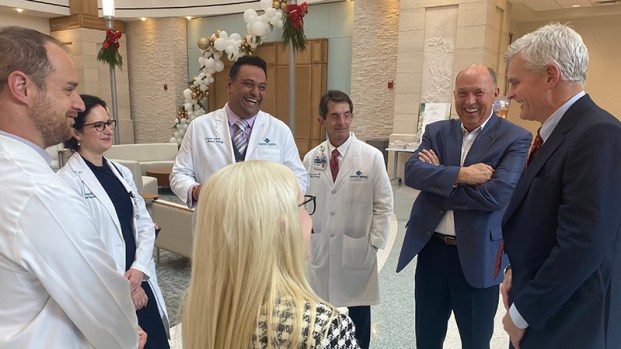Cassidy visits Thibodaux Regional Cancer Institute
Published 9:20 am Saturday, December 11, 2021
|
Getting your Trinity Audio player ready...
|
WASHINGTON – On December 10, U.S. Senator Bill Cassidy, M.D. (R-LA) gave remarks at a luncheon celebrating the opening of the new Thibodaux Regional Cancer Institute, which will serve as the destination for the region’s oncology needs.
The Thibodaux Regional Cancer Center treats more than 95% of cancers and has patient outcomes better than the national average. It also treats five times more breast cancer patients than any other facility in the region, and offers the latest technologies in radiation treatment to mitigate for radiation exposure.
“Attended the grand opening of the Thibodaux Regional Health System Cancer Institute. It is a fantastic facility, as good as any I’ve seen,” said Dr. Cassidy. “Great doctors, great staff. This is a wonderful addition for the Bayou Region.”
Cassidy was joined by Mr. Greg Stock, CEO of the Thibodaux Regional Health System.
“We appreciate Senator Cassidy’s support of Thibodaux Regional Health System in all of our endeavors,” said Stock. “As a physician, the Senator offers a unique perspective and understanding of the importance of availability of quality healthcare to the citizens of our region. With the opening of our new Cancer Institute, our enhanced services and advanced technology will provide the best in cancer care without patients having to travel far from home.”
Cassidy himself has been a leader in healthcare reform, including helping those with cancer. In April, President Biden signed Senator Cassidy’s Advancing Education on Biosimilars Act, which will enhance education about biosimilar drug products in order to increase competition and lower the cost of biologic medicines. This will include medicines that treat certain cancers.
Additionally, Cassidy this year has introduced bi-partisan legislation to lower drug prices for seniors, remove barriers to telehealth medicine, support childhood cancer research, and combat obesity with Medicare-funded treatment options. These bills would reduce the cost of cancer drugs, increase access to cancer care and make it less likely people are affected by cancer.







